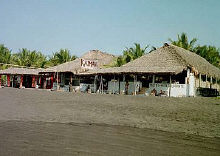
Beach-front restaurants in Monterrico
![]()
After a week of intensive Spanish lessons in Antigua, I headed out on what was meant to be a relaxing weekend in the beach village of Monterrico. On the journey down I met Beth, a 33-year old surgeon from Boston. She had just finished a medical Spanish course at my school and, like me, was looking forward to some downtime at the beach.
After two hours our bus dropped us off at a canal and we stepped from a small dock onto a very long wooden boat filled with other tourists and locals. We glided through lush mangrove swamps and finally arrived at Monterrico, welcomed by a large Coca-Cola banner strung between two palm trees. We piled out of the boat and walked down a dirt road leading past a dozen thatched-roof restaurants. The restaurants were all built in similar style, with open fronts and sides and a single wall at the back that hid the kitchen and the proprietor living quarters.
The road ended at a black sand beach and a blue-gray ocean. Local children came up to us chanting “Hotel? Hotel?” Beth and I had reservations at the same place so we had one little boy show us the way. His name was Eddy, he was 11 and his parents owned the last bar/restaurant at the end of the road before it ran into the beach. When we got to the hotel we gave Eddy a few coins and checked into our rooms, Spartan at best, but offering the only non-thatched roof lodging in town. In other words, mosquito netting was not a requirement. Luxury!
At dusk we walked back to the beach and signed up for the turtle races. Reading about this event in the guidebook was what had made me decide to go to Monterrico. Here’s how it works: Every night just before dark, the workers from the turtle sanctuary bring out buckets of baby turtles hatched just a few days before. Then they stretch out a rope parallel to the surf, and everybody lines up behind it. For a small fee you can pick a turtle out of the bucket, and when the whistle blows you set it down and cheer it on as it heads out into the surf. By letting the little guys swim out en masse, the sanctuary is upping their chances of survival. The donations help pay expenses for the turtle project, and the person whose turtle wins receives a free dinner from a local restaurant. Unwisely, my turtle used up all his steam kicking and flailing in my hand while we were waiting for the whistle to be blown. He ended up being one of the last to enter the surf. So much for the veracity of the tortoise-and-the-hare story.
From talking to my classmates back in Antigua, this 20-minute event was about as much excitement as the village had to offer. “You’ll get a lot of studying done in Monterrico,” is what I was told. Beth and I struck up a conversation with Carmen, a Canadian woman living there who helped the sanctuary workers communicate with the tourists in English. It was not hard to observe that most of the village lived in poverty. The buildings are primitive, and the dirt roads and black sand are littered with trash. Mangy dogs, pigs and chickens walk freely through the open-air restaurants. In front of tourist bungalows, small swimming pools of stagnant water become breeding havens for mosquitoes. Beth wondered what kind of medical services they had. Carmen explained that they have no hospital or clinic or doctor or midwife. People who become ill must travel at least an hour to the nearest clinic and seriously ill or injured patients must go all the way to Guatemala City (four hours away).
Before we knew it Beth and I were discussing a plan to open a clinic in Monterrico. We talked late into the night about the logistics of setting up a clinic including how to get funding and donations of supplies, how to get through the bureaucracy and whether we might face resistance from any of the villagers. I told Beth I wanted to help even though I have no medical training – to teach classes or run the reception area or whatever. “Oh no,” she said. “I will have you doing a lot more than that.” She asked if the sight of blood bothered me and I said no.
That was a lie.
But I could not admit that now, I was in too deep! Finally we went back to our hotel and I slept hard despite the 50-plus mosquito bites all over my body.
Early the next morning I was awoken by Carmen pounding on my door. “Beth needs your help,” she said. Without knowing any details I quickly put in my contacts, pulled my hair into a ponytail and grabbed my camera and flashlight. As we hurried down the dirt road Carmen told me that at around 5am a drunken local man had gone into the bar owned by our little friend Eddy’s parents. He had demanded a bottle of white rum and when they refused, he had attacked them with a machete.
“Beth has already started stitching them but one of the wounds is quite close to a vein or something so she told me to get you,” she explained. “By the way, what’s your profession?”
“I’m in marketing,” I said.
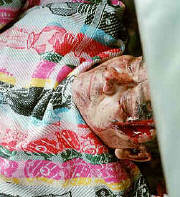
Adrian’s head wound
![]()
When I got to the beach I saw dozens of people gathered around the steps to the bar. Beth was directing some men as they picked up the husband and then the wife by their arms and legs and slid them into the back of an SUV. The steps, the victims and Beth were covered in blood.
The machete had chopped into the woman’s arm and she had a deep open gash from her right eye to behind her ear. Her husband, trying to protect her, had taken even worse blows to his arm and back, and a chunk of his forehead was missing.
Beth and two local guys squeezed into the back with the couple, and the driver and I climbed into the front. I turned backwards and wedged my knees between the driver and passenger seats. Eddy’s 17-year old sister got into the passenger seat and we headed down a dirt road.
On the trip down from Antigua we had bumped around enough that even taking a drink of agua from a bottle was a challenge. Now Beth was trying to continue suturing the woman’s head as she kneeled beside her.
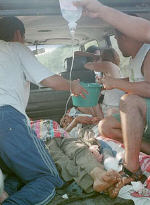
Our makeshift ER
![]()
The two victims were lying side by side on their backs, their feet towards the rear of the truck where one of the helpers held up an IV bag. The pharmacy in Monterrico had had only one bag of fluid in stock so Beth had given it to the husband. Anesthetic too was in short supply and quickly ran out so that now she was suturing the woman with nothing to ease her pain. She did not seem to feel much though, rarely flinching, and we kept calling “Senora! Senora!” when she closed her eyes so she wouldn’t go to sleep.
The second man in the back was handing me pieces of cotton that we used to soak up the blood in the wound whenever it started gushing too much for Beth to see what she was doing. The rest of the time I held my flashlight over the area she was stitching and patted the woman on the cheek to keep her alert.
Meanwhile Eddy’s father had lost around three liters of blood and was going into shock. Beth showed me how to do a sternal rub by pressing down on his chest with my knuckles and making circles to stimulate him. In his more lucid moments he asked me to scratch his nose and when he said “Abajo” I stupidly couldn’t remember if that meant higher or lower. I scratched higher up on his nose, but one of the guys in the back pointed down. Beth told me to check his pupils to see if they were the same size and they were.
Finally we got to a part of the canal that had some boats sturdy enough to hold a vehicle and we drove across two wooden planks onto our one-car ferry. As we passed through the swamps the much smoother ride allowed Beth to finish stitching up the woman’s head. By now blood had collected under her skin near her eye and puffed up like a pillow. With no other choice we balled up a cotton shirt and I used it to apply pressure so the blood would squirt out.
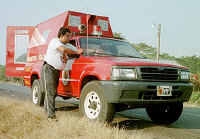
Finally, the ambulance
![]()
Eventually we got to another dock and drove off the boat onto another bumpy dirt road. After driving several miles we were met by the ambulance coming in the opposite direction.
The paramedics transferred Eddy’s parents into an ambulance and their daughter, now crying, climbed in with them. Two policemen go into our van and we drove back to the dock, onto the boat and back down the road to Monterrico.
We went to Eddy’s house where his 20- and 14-year old sisters were opening up for business with the help of a neighbor. The police talked to them while the girls threw buckets of water on the cement floor to wash away their parents’ blood. They unstacked wooden tables and plastic chairs and began serving customers. We found out that Eddy had been awakened by the yelling of the drunken man and had seen the whole event take place. Of course he was extremely traumatized. Beth took him for a walk down the beach and I babysat the younger children (there were seven in all) in the squalor of their kitchen. We played peek-a-boo and other silly games while we swung from hammocks.
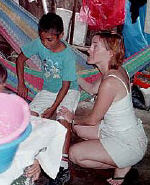
Beth comforts Eddy
![]()
Carmen came and told us that the father was in a coma and had been taken to a hospital in Guatemala City. His wife, who was being treated at a closer basic hospital, was doing better and was expected to recover. During the whole journey I had felt grossly inadequate in terms of my Spanish and my medical skills. Amazingly though, I didn’t get lightheaded or nauseated. Beth told me later that in the US these injuries would not have been life threatening, but because of the lack of facilities and supplies Eddy’s parents would have bled to death without our help. It was amazing to know that what little I did contributed to preventing seven children from being orphaned.
When Beth and Eddy returned from their walk she told me that a woman with an infected foot had flagged her down and we needed to bring her some antibiotic cream.
“The clinic is open for business,” she said.
“You know when I told you that I wasn’t afraid of the sight of blood?” I asked her. “I was lying.”
“I know you were,” she said.
Epilogue (e-mail from Carmen – Dec. 17, 2001)
Hi Laurie,
Yes… Adrian is back on the beach. He had arrived at the hospital in a coma and they weren’t sure that he would pull through. I spoke with him about a week and a half ago. In lots of pain but mobile. At that time his wife was still in the hospital because they were concerned about the nerves in her arm and were waiting to see if she would be able to move it, I believe. I haven’t spoken to Adrian since (my son has been ill and so my movement is limited) but will pass by this week and see. All the neighbors helped out the night of the accident. The grandparents of the kids came and took them back with them to their town for a couple of days until Adrian was released from the hospital. I spent some time talking with Eddy that night and then he went with his grandparents. He now spends his time with his father helping him out since Adrian’s arm is all bandaged up and he can’t use it.
Keep in touch.
Carmen
Questions?
If you want more information about this area you can email the author or check out our Central America Insiders page.
![]()